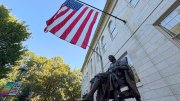On Monday, Harvard filed suit against the federal government, sending the battle between the University and the Trump administration to federal court. Harvard argued that the government’s funding freeze—threatening at least $2.2 billion in research grants—violates the First Amendment and the established procedures for curtailing campus violations of civil rights, such as antisemitism. The demands imposed by the government, President Alan M. Garber wrote in an April 21 community-wide email, “would impose unprecedented and improper control over the University.”
The University said its differences with the government—which the government has broadened to include attacks on Harvard’s tax-exempt status, ability to host foreign students, and other matters—have broad consequences. When the federal government targets medical and scientific research, Garber wrote, “The victims will be future patients and their loved ones who will suffer the heartbreak of illnesses that might have been prevented or treated more effectively.” He continued, “Indiscriminately slashing medical, scientific, and technological research undermines the nation’s ability to save American lives, foster American success, and maintain America’s position as a global leader in innovation.”
Harvard has acknowledged the importance of some federal demands—notably promoting viewpoint diversity and combating antisemitism—but argued that institutions of higher education rather than the government should primarily carry out those missions. Garber amplified University efforts to reduce campus antisemitism. “As a Jew and as an American, I know very well that there are valid concerns about rising antisemitism,” he wrote. Fighting antisemitism, he continued, “is not only our legal responsibility. It is our moral imperative.”
In the suit, Harvard cited updates to its regulations and disciplinary policies “aimed at ensuring campus is safe, fair, and welcoming to Jewish and Israeli students.” These include time, place, and manner protest restrictions; renewed rules for campus use; a ban on demonstrations in libraries and suspension of library access for students and faculty members who protest there; the dismissal of a librarian who tore down rightfully placed posters of Israeli hostages; and the suspension of the undergraduate Palestine Solidarity Committee for co-hosting protests with unrecognized campus groups.
Harvard’s lawyers (two of whom previously worked with the Trump administration) laid out several claims on First Amendment grounds. They argue that academic freedom is protected by the First Amendment and that a “funding condition” that seeks to curtail academic freedom can therefore “result in an unconstitutional burden on First Amendment rights.” They also argue that the demands upon Harvard bear no relation to the targeted funding, which violates the principle that the government may not “leverage funding to regulate speech outside the contours of the program itself.” Harvard argues that the demanded conditions, if enacted, would “chill Harvard’s exercise of its First Amendment rights,” ranging from faculty hiring, academics, admissions. The attorneys write that “Harvard will be unable to make decisions…without fear that those decisions will run afoul of government censors’ views on acceptable levels of ideological or viewpoint diversity on campus.”
The suit also lodges a complaint through Title VI of the Civil Rights Act of 1964, which compels schools receiving federal assistance to protect students regardless of race, color, or national origin. (In January, Harvard settled a pair of Title VI lawsuits relating to campus antisemitism.) Though that law requires Harvard to safeguard Jewish students, the lawyers note that there is a “detailed and mandatory statutory framework” that the government must follow before freezing any university’s funding for civil rights violations. The department implementing such a freeze must rule that the university cannot or will not comply willingly, conduct a hearing and share findings on the record, file a written report, and wait another 30 days before freezing funds. None of this has happened.
At the end of the 51-page filing, Harvard asked the court to declare the freeze order and the associated demands unlawful or to postpone their activation dates. The lawsuit caps a chaotic month in Harvard’s battle with the federal government.
- March 31: The General Services Administration sent a letter to Harvard announcing its review of $8.7 billion in federal grants to Harvard and hospital affiliates.
- April 3: The government detailed its demands to Harvard, which include program oversight, disciplinary and admissions reform, and the end of Diversity, Equity, and Inclusion (DEI) programs.
- April 11: A second government letter “incorporates and supersedes” the original letter and includes even broader terms. The New York Times reported that the second letter was “unauthorized” by the Trump administration and should not have been sent. The Wall Street Journal later reported that the Trump administration was surprised that Harvard publicly released the letter. In response, the government would amp up its actions.
- April 14: In a community email titled, “The Promise of American Higher Education,” Garber declined the government’s demands. That evening, the multi-agency Task Force to Combat Antisemitism froze $2.2 billion in multi-year grants and $60 million in multi-year contracts.
- April 16: The Department of Homeland Security threatened Harvard’s eligibility to enroll international students.
- April 19: The U.S. Department of Health and Human Services Office for Civil Rights asked Harvard to turn over its still-unreleased reports by the task forces on combatting antisemitism and anti-Muslim, -Arab, and -Palestinian bias.
- April 20: Reports emerged that President Trump, furious with Harvard over the University’s refusal to accept the government’s demand letter, plans to pull an additional $1 billion in health funding.
While Harvard’s research funding enters the courts, many University researchers remain unsure about the status of their funding. Scientists across the University received stop-work orders from their federal grant-givers, halting projects ranging from radiation exposure and ALS diagnostics to tuberculosis treatments.









